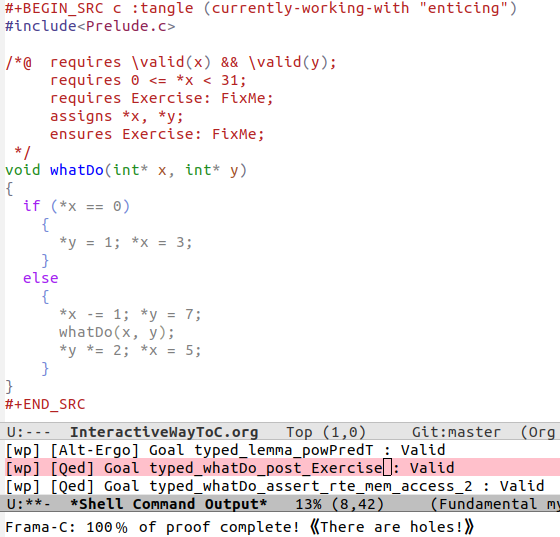Here are some of my latest thoughts on program-proving… 

Typed Lisp, A Primer





Let's explore Lisp's fine-grained type hierarchy!
We begin with a shallow comparison to Haskell, a rapid tour of type theory, try in vain to defend dynamic approaches, give a somewhat humorous account of history, note that you've been bamboozled —type's have always been there—, then go into technical details of some Lisp types, and finally conclude by showing how macros permit typing.
Goals for this article:
- Multiple examples of type constructions in Lisp.
- Comparing Lisp type systems with modern languages, such as Haskell.
- Show how algebraic polymorphic types like
PairandMaybecan be defined in Lisp. Including heterogeneously typed lists! - Convey a passion for an elegant language.
- Augment Lisp with functional Haskell-like type declarations ;-)
Unless suggested otherwise, the phrase “Lisp” refers to Common Lisp as supported by Emacs Lisp. As such, the resulting discussion is applicable to a number of Lisp dialects —I'm ignoring editing types such as buffers and keymaps, for now.
An Interactive Way To C





Do you know what the above program accomplishes? If you do, did you also spot a special edge case?
We aim to present an approach to program proving in C using a minimal Emacs setup so that one may produce literate C programs and be able to prove them correct –or execute them– using a single button press; moreover the output is again in Emacs.
The goal is to learn program proving using the Frama-C tool –without necessarily invoking its gui– by loading the source of this file into Emacs then editing, executing, & proving as you read along. One provides for the formal specification of properties of C programs –e.g., using ACSL– which can then be verified for the implementations using tools that interpret such annotation –e.g., Frama-C invoked from within our Emacs setup.
Read on, and perhaps you'll figure out how to solve the missing FixMe pieces 😉
The intent is for rapid editing and checking. Indeed, the Frama-c gui does not permit editing in the gui, so one must switch between their text editor and the gui. Org mode beginning at the basics is a brief tutorial that covers a lot of Org and, from the get-go, covers “the absolute minimum you need to know about Emacs!”
If anything, this effort can be construed as a gateway into interactive theorem proving such as with Isabelle, Coq, or Agda.
The article aims to be self-contained —not even assuming familiarity with any C!
The presentation and examples are largely inspired by
- Gilles Dowek's exquisite text Principles of Programming Languages.
- It is tremendously accessible!
- Allan Blanchard's excellent tutorial Introduction to C Program Proof using Frama-C and its WP Plugin.
Another excellent and succinct tutorial is Virgile Prevosto's ACSL Mini-Tutorial. In contrast, the tutorial ACSL By Example aims to provide a variety of algorithms rendered in ACSL.
There are no solutions since it's too easy to give up and look at the solutions that're nearby. Moreover, I intend to use some of the exercises for a class I'm teaching ;-)

Life & Computing Science by Musa Al-hassy is licensed under a Creative Commons Attribution-ShareAlike 3.0 Unported License
